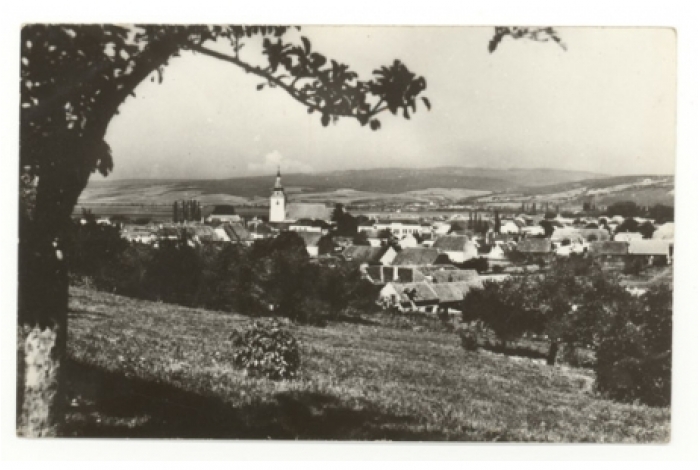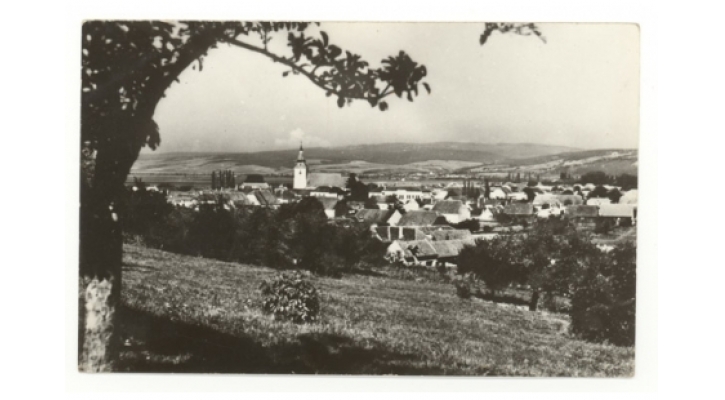Is Brasov Breaking Bod?
All across the world the development of cities has begun to encroach upon rural living. Brasov is a prime example of these changes, a place where the contrasts between the environments are incredibly stark.

The village of Bod back in '50s
However, people continue to try to integrate the two ideals of a traditional way of living and modern life that is brought with the growth of cities. The small villages surrounding these big cities are those most changed by modernity such as Bod, a village on the outskirts of Brasov city. We spoke to three different families within the village in order to find out how city life has affected their village and how it has shaped their lives. Following our interviews of the villagers, we were surprised at the divergent attitudes towards the impacts of Brasov city upon the village. It became clear that whilst some people now enjoy the various advantages brought by the city, others feel that the rapid expansion of Brasov is proving detrimental to Bod village, causing changes in the attitudes of people as well as the loss of certain traditions.
A Step Back in Time
Heading out of the city of Brasov and into the suburbs, I could not help but notice how the city is beginning to slowly seep into the countryside as it continues to expand. It soon became apparent, however, that the citizens of Bod continue to go about their daily lives as they always have. Bod seems to have managed to maintain its traditional values despite the increasingly modern culture just minutes from their doorstep.
On speaking to Muntean Mihaica, who moved to Bod in 1952, she informs me that living on the outskirts of an increasingly modern city has not influenced her life in any way. She believes she has everything she needs in Bod. Mihaica is perfectly content with her simple way of life in the country. She spends her days cooking, cleaning, working in the garden, taking care of her grandchildren and great grandchild; who bring her happiness and a sense of life.
Although Mihaica has a daughter who lives in Brasov, she rarely visits her there, preferring for her to instead come to Bod. She grows vegetables in her garden and uses these products in her cooking along with products from Bod, and feels she has no need to visit Brasov at all. When asked if she feels pressure to adapt her lifestyle in order to fit it in with the increasingly westernized culture around her, she answered, “Yes, but only for my grandchildren, who lead very modern lives.” Even though Mihaica is adamant that she does not want to move in to Brasov, she speaks very highly of the city. “It [Brasov] is very modernized and very beautiful, and the life in Bod needs to be changed according to how Brasov changes even though it could never be equal to Brasov. However, it should get more and more developed as a community.” She also believes that Brasov is managing to uphold Romanian traditions better than any other city in Romania, by holding the parade Junii every year, for example.
The aspect of living in a small town which most makes Mihaica want to stay is the way in which the villagers interact with one another. She says that they are very honest and want to help each other. No one has ever stolen from her yard or house in the sixty years she has lived there. Furthermore, she enjoys breathing the fresh country air and being away from the pollution of the city.
It was both enlightening and refreshing to meet Mihaica. She is content with the simple pleasures that we so often take for granted in our daily lives, and is continuing to appreciate traditional life in a world where it is increasingly difficult to do so.
Making a New Life in Bod
With its many wells replacing running water and horses pulling along carts full with pails of milk, Bod, a village close to the city of Brasov, is evidently harbouring a traditional way of life. However, you can catch glimpses of the way the big city has affected the small village: electric street lighting along the roads and access to mains gas pipes.
Sanda Ciobanu, 68, moved to the village ten years ago from Brasov. She dealt with the difficulties of adapting to such a different style of living and she has seen the village begin to adapt in conjunction with the modern times.
For Sanda, moving to a rural location was a massive shock. At first she struggled to deal without the comforts of the city such as running water and access to gas. Feeling upset, Sanda frequently visited her daughter for the simple luxuries of modern life (like having a bath!). But with Bod being such a beautiful village, she was determined to adapt to her new environment. She and her family set about building a well for fresh water and making changes to the house.
Whilst Sanda worked to become accustomed to village life, Bod itself also faced difficulties in adapting.
Modern amenities that many of us take for granted were not available to the villagers.
“We had to depend on the mayor to make changes to our village, and because he was not of the same political party as those within the city, no money was invested in Bod,” said Sanda.
“For our first year living here there was no electricity on the streets. It was incredibly frustrating,” she added.
Bod has changed in some respects, but it cannot keep up with the pace at which the city is developing. The facilities are basic - they do not have access to everything yet: they now have electricity on the streets and gas, but they do not have running water pipes through the village.
In many respects, living close to a large town enables Sanda and her family to have the best of both worlds. Although some facilities aren’t readily available to them in Bod, they enjoy the rural way of life – the peace and quiet, safety and simplicity – yet they are still able to easily visit the city for necessities such as groceries and clothes shopping.
Goodbye Tradition, Hello Brasov
On the outskirts of Brasov city is Bod village, a community associated with tradition and rural values, but one also undergoing major changes as a result of the development of Brasov city nearby. After speaking with some local villagers, it became abundantly clear that – for some – the rapid expansion of this city has proved detrimental for the village and its people.
Arriving in Bod was like stepping into the past. It was busy with numerous horse-drawn carts carrying food; however, the telephone wires along the roads demonstrated how the city is forcing the village to modernise.
Gelu Ciucas was born in 1937 and has lived in Bod his whole life, witnessing the drastic changes encountered by the village over the years. Gelu’s face lights up when he describes the period before the development of Brasov city when the village was “very clean, with well-kept lands” for the self-subsistent villagers. He also reflects upon the traditional celebrations within the village: joyous occasions filled with people dancing and laughing, whilst sharing food.
The introduction of Brasov city, however, “completely changed everything”. Gelu remembers the introduction of telephones, the internet and numerous other technological advances and facilities, as well as the sudden increase of young people moving to the city in order to study at university or to find jobs. A look of worry comes across Gelu’s face as he explains that many people can no longer work their land without the help of these young people, something which leads to countless acres of unused, wasted land.
Another problem Gelu acknowledges is the changed attitude of people within the village. He describes the fact that “people are not the same now; [they] used to work as a team, but have now lost that connection of working together”. I can sense, too, that he does not feel the villagers are properly taken care of, something largely due to the fact that Brasov is no longer funding Bod as the mayor of Brasov is not of the same political party as the mayor of Bod – the effects of which are felt deeply by the Bodeni. For example, Gelu explains to me how the education in the village is now very poor, but also how he feels that “society is going downhill due to the loss of certain traditions within Bod”.
Once again, I am aware of Gelu’s melancholic expression as he talks about Romanian and German bands that used to play every weekend in Bod, complete with traditional costumes and music. These festivities and gatherings are now simply an entity of the past, as the lack of them in the city discourages villagers from continuing their traditions.
Whilst the city brings certain possibilities and opportunities to the village – such as the modernization of technology – it is saddening to realize that it is also the cause of the loss of traditional values and ideals upon which Bod has depended and strived under for so long. In spite of this, however, many of the Bodeni plan to stay in their village. Gelu informs me that he “would not live in a flat in Brasov even if he owned the entire block!”
By Hannela Matthews, Maisie Stedman, Rebecca Lewinton
Photos: by Rebecca Lewinton, Ana A. Negru




